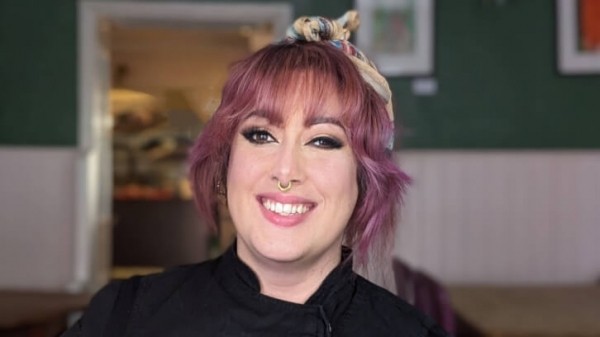Ayesha Kalaji is stepping into spring

Kalaji opened the Queen of Cups in Glastonbury in the summer of 2021, and since it has been awarded a Michelin Bib Gourmand and was shortlisted for ‘best newcomer’ at the Estrella Damm Top 50 Gastropub Awards 2023.
The chef, who serves her own interpretation of Middle Eastern dishes, says: “At the moment we’re starting to get into spring, so a lot of the flavours are changing.
“I’m really enjoying this transition period, where wild garlic has started to come out, and you’re seeing the rhubarb, but we’ve got the tail end of the radicchios and citruses.”
It’s becoming a “lighter and brighter” menu. Kalaji always has a form of Labneh on her menu, but it’s changed seasonally, so it’s recently become a wild garlic Labneh, and uses byproducts to make a lemon whey caramel. “So we’ve got that really zesty, bright, peppery wild garlic flavour with the sweetness of the whey caramel that’ slightly sour from the yoghurt.”
She continues: “That’s a confit garlic, pomegranate and a za’atar pangrattato,” which are “very middle eastern flavours but really encapsulates what’s coming into season at the moment and feels like a step into spring.”
Kalaji is creating a brighter menu away from wintery flavours. Red miso and cardamon graze hispi cabbage will be swapped with a dish that includes limes and cauliflower, which is more “bright, zingy and citrusy”.
This is also reflected in her desserts. The menu is moving over from a dark chocolate & Persian lime dessert to an Assam tea pannacotta with blood orange and dates, reminiscent of tea at her grandmothers in spring.
She says: “One of my favourite things about having my own restaurant is having that creative freedom with the menu, because obviously I’ve worked for other people, and you suggest specials. But here, I work with local farmers, five miles from the restaurant, and in spring, summer and autumn, my menu is so heavily focused on what they can actually give me.
“I love being able to work that way, because it challenges me as a chef and keeps me thinking, but it also keeps my team engaged, because they're not having to cook the same thing day in day out.”
While the chef has 95% control over the menu, she is always keen to take the teams’ ideas for specials to create things “fresh and exciting”.
Building the confidence of young chefs is her favourite thing to do. For many in her kitchen, it’s their first cooking job where they’re being asked to think of ideas.
She tells a story: “One of them came to me because he wanted to do something with stem ginger ice cream, so we worked together and thought, what flavours can we pair this with? Okay, black cardamom, that'd be a fantastic combination, we've got this amazing olive oil, why don't you try putting that on it?
"It’s about being able to take the younger chefs and suggest flavour pairings and help them expand their palate and knowledge.”
Fusing Middle Eastern flavours with seasonal British ingredients means Kalaji has been able to offer customer things they’ve never tried before. She wouldn’t call herself ‘authentically’ Middle Eastern, growing up in Wales, but spending summers in Jordan.
“A lot of this is my own interpretation of my heritage. When I decided I wanted to learn more about that side of myself, the food was a very tangible way for me to connect with my heritage, so it's not authentic, it's through my lens.”
She’s now got an entire pantry of flavours to play around with. She brings sumac back from Jordan, and customers also bring her spices when they visit the Middle East: “It’s wonderful”.
Playing with flavours
She says: “I like showcasing that the food is more than just falafel, hummus and shawarma, it can be so much more than that – it can be floral, it can be delicate, it can be bold, it can be savoury… it can combine so many flavour profiles you don’t really see in British food.
“I feel I’m able to show people a taste of the Middle East in a way that’s not only approachable, but delicious.”
For instance, she had a monkish dish that was confit in cured lemon oil with an araq beurre blanc, araq being a Levatine spirit. “It’s introducing them to these ingredients in a way they may never have seen before and ingredients they may never have tried,” says Kalaji. “I really appreciate I’ve got customers who trust me to make things and they like it.”
What’s her best-selling dish? “Everyone loves the hummus,” she laughs. But there’s also a traditional Palestinian grilled Nabulsi cheese, which is fried, then baked, then finished on a charcoal grill, before being served with a honey infused with Persian black lime with dried oregano and cured lemon on top. “So you’ve got that salty cheese, that sticky honey, that sharpness from the lemon, that slightly sour flavour from the lime, then that super umami oregano.
“Who doesn’t love fried cheese? I love it, and it’s just an amazing product by a Syrian refugee making Palestinian cheese, and I just love being able to showcase a product like that to people.”
Her favourite to cook is the hogget dish, which showcases a nose-to-tail approach. “It’s a lengthy process,” she says. Hoggets are sourced from a local farm, and are slow braised with cured lemons, vine leaves and oregano. Then the meat is picked, pressed and left overnight. The next day it’s breadcrumbed then deep fried. “It’s got that lemony unctuousness through it,” she says.
It’s served with a skewer of hearts. “If you overcook heart, it’s like a piece of rubber – it’s something that requires concentration.” It’s paired with a yeasted celeriac puree, a seasonal fresh herb salad with a jus and some rose petals as well as a walnut and black garlic gel. “So many flavour notes are hit,” says Kalaji. “There’s savoury, three’s the fattiness of the meat, but then you get the gel that cuts through that.”
Locality & seasonality
The dish’s many elements make it “so satisfying” to cook, but it’s also aesthetically pleasing: “Anything I can put rose petals on I will.”
Locality and sustainability are important for Kalaji, who works with nearby suppliers and changes her menu with the seasons. Around three quarters of the menu is vegan or vegetarian, and she also works with foragers who give talks in the pub on foraging safely, before the chef cooks the food.
She’s been inspired by other chefs throughout her career, including her first head chef, Tomer Amedi, and former executive chef at Bubala, London, Helen Graham.
Plant-based restaurant Bubala also taught her how to showcase veg as the centrepiece of a dish. Kiln, a restaurant in London serving up northern Thai-inspired cuisine, is one of her favourite venues.
It’s always been important for Kalaji that the local community in Glastonbury can come and enjoy food at the pub. She’s keen to showcase that ‘pub grub’ can be more than what people expect. “You can have a pint of Guinness with falafel,” she says. “It’s brilliant”.
And since the pub opened, she’s noticed consumers have become more adventurous. Octopus, something she was hesitant to put on the menu, sold out, and guests also love the lamb heart.
She says: “I think that’s because we've been here almost three years now people have built a bit more trust and are willing to try new things. That’s just so exciting for me.”
There’s not a dish on her menu she doesn’t wholeheartedly believe in. She adds: “I'm not doing it because I think it’s trendy or it will sell well. Everything on the menu is something I’m really excited to share with people.”






